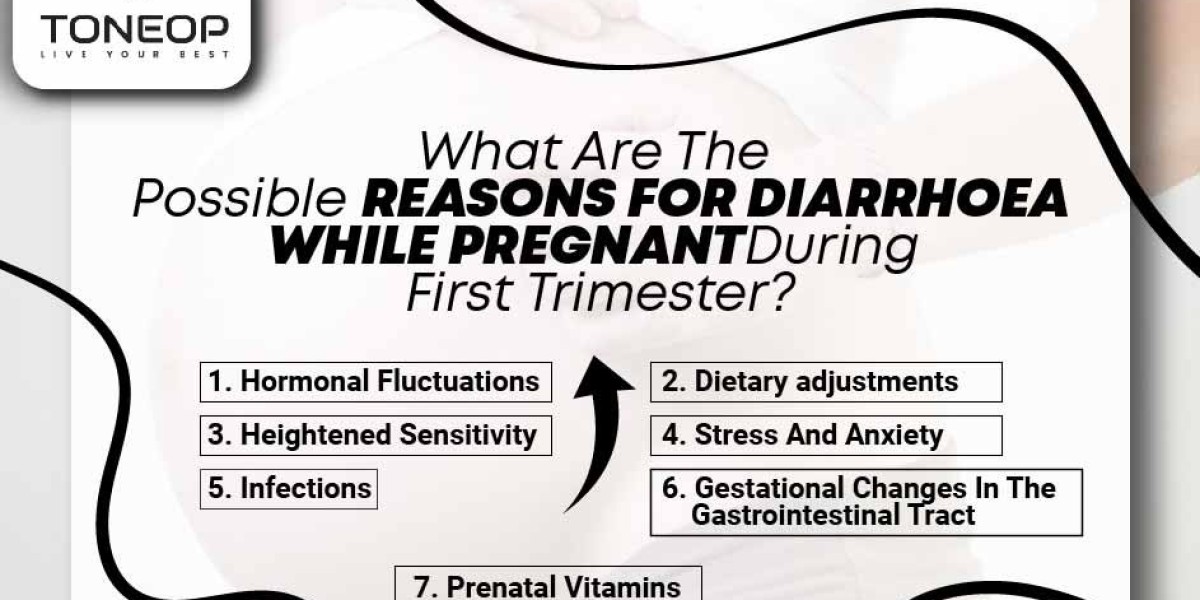Pregnancy is an exciting and transformative journey, but it can also bring unexpected health issues, including diarrhoea. It’s not uncommon for expecting mothers to experience gastrointestinal discomfort, especially during the first trimester. Diarrhoea, characterized by loose or watery stools and often accompanied by abdominal pain, can be particularly concerning. Understanding its causes is essential to ensure the well-being of both mother and baby.
In this article, we explore seven medical reasons for diarrhoea during pregnancy and provide tips on managing this symptom.
Possible Causes of Diarrhoea During Pregnancy (First Trimester)
Diarrhoea is a common issue in pregnancy, though research on its prevalence is limited. It can result from changes in your body due to pregnancy or unrelated factors like infections. Here are seven possible causes of diarrhoea in the first trimester:
1. Hormonal Fluctuations
Early pregnancy brings significant hormonal changes, including a rise in progesterone levels. This hormone relaxes smooth muscles, including those in the digestive tract, slowing digestion and leading to loose stools. Additionally, prostaglandins like oxytocin can stimulate uterine contractions and trigger frequent bowel movements, similar to the effect during menstruation.
2. Dietary Adjustments
Pregnancy often leads to changes in diet, such as increased consumption of fibre or the introduction of prenatal vitamins. While these dietary shifts are beneficial, they can sometimes cause digestive upset as your body adapts, potentially leading to diarrhoea.
3. Heightened Sensitivity
Pregnancy can alter your immune response, making you more sensitive to certain foods or pathogens. This increased sensitivity may cause the digestive system to react more strongly, leading to diarrhoea after consuming certain foods or encountering harmful bacteria.
4. Stress and Anxiety
Emotional changes are common during early pregnancy, and stress can affect gut function. Hormones like cortisol, produced during stress, can disrupt digestion and lead to diarrhoea.
5. Infections
Pregnancy makes you more susceptible to infections caused by viruses, bacteria, or parasites, which can trigger gastrointestinal symptoms, including diarrhoea, as your body fights off these pathogens.
6. Gestational Changes in the Gastrointestinal Tract
Physiological changes in the gastrointestinal tract during pregnancy, such as altered motility and absorption, can contribute to diarrhoea, particularly during the first trimester.
7. Prenatal Vitamins
While essential for a healthy pregnancy, prenatal vitamins can sometimes lead to diarrhoea. High levels of nutrients like iron and magnesium may upset the digestive system in some women, especially as the body adjusts to higher doses.
The Final Say
Diarrhoea during pregnancy is relatively common and can be triggered by hormonal shifts, dietary changes, increased sensitivity, stress, or infections. While it’s usually not a cause for concern, persistent or severe diarrhoea should be addressed to avoid dehydration and safeguard maternal and fetal health. With proper care, most cases can be managed without complications.
FAQs
1. Is loose motion during pregnancy a concern?
Occasional loose stools are generally harmless, but persistent diarrhoea should be treated to prevent dehydration and other complications.
2. Can you experience diarrhoea along with morning sickness?
Yes, it’s possible to experience both, as pregnancy affects the digestive system in multiple ways due to hormonal and physical changes.
3. Can diarrhoea harm the baby?
If properly managed, diarrhoea during pregnancy is typically not harmful to the baby.
About ToneOp
ToneOp is dedicated to helping individuals maintain optimal health through personalized plans, offering services like weight management, medical condition programs, and more. The platform provides health trackers, expert content, and customized diet, fitness, and yoga plans for a healthier lifestyle.
Visit our website:
https://toneop.com/blog/reasons-you-might-experience-diarrhoea-while-pregnant









